英语人教版七年级上册一般现在时
英语人教版七年级上册知识点
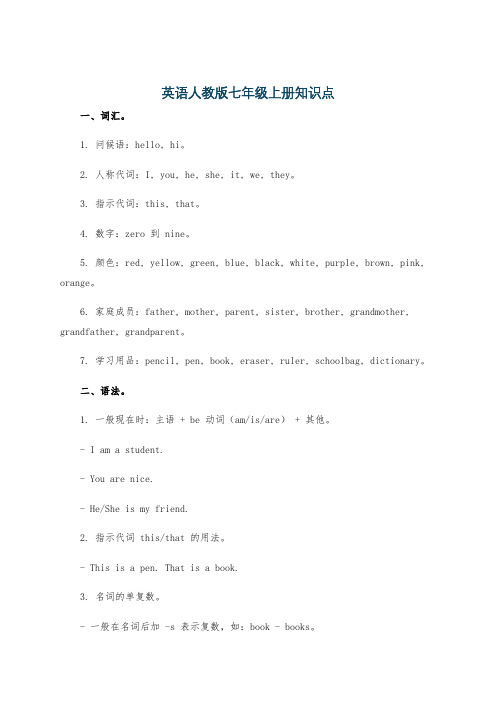
英语人教版七年级上册知识点一、词汇。
1. 问候语:hello, hi。
2. 人称代词:I, you, he, she, it, we, they。
3. 指示代词:this, that。
4. 数字:zero 到 nine。
5. 颜色:red, yellow, green, blue, black, white, purple, brown, pink, orange。
6. 家庭成员:father, mother, parent, sister, brother, grandmother, grandfather, grandparent。
7. 学习用品:pencil, pen, book, eraser, ruler, schoolbag, dictionary。
二、语法。
1. 一般现在时:主语 + be 动词(am/is/are) + 其他。
- I am a student.- You are nice.- He/She is my friend.2. 指示代词 this/that 的用法。
- This is a pen. That is a book.3. 名词的单复数。
- 一般在名词后加 -s 表示复数,如:book - books。
- 以 s, x, ch, sh 结尾的名词加 -es,如:box - boxes。
- 不规则变化,如:man - men, woman - women。
4. 形容词性物主代词。
- my(我的),your(你的/你们的),his(他的),her(她的),its(它的),our(我们的),their(他们的/她们的)三、句型。
1. 打招呼和自我介绍。
- -Hello! I'm Mary.- -Hi! My name is Tom.2. 询问物品。
- -What's this/that in English?- -It's a/an...3. 确认物品所属。
人教版七年级上册英语时态讲解
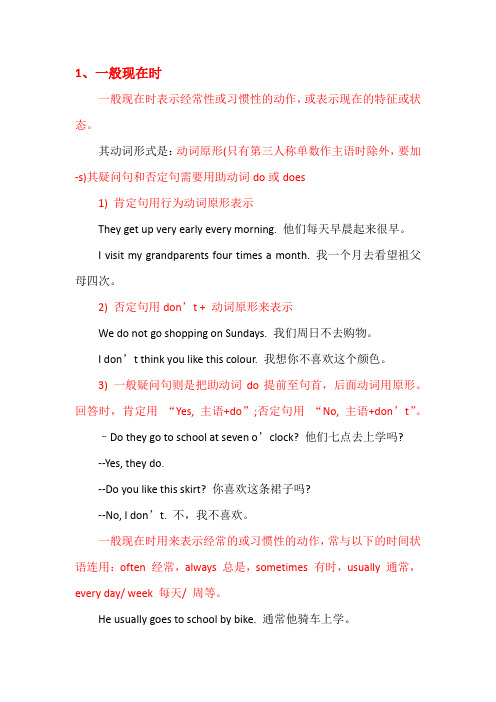
1、一般现在时一般现在时表示经常性或习惯性的动作,或表示现在的特征或状态。
其动词形式是:动词原形(只有第三人称单数作主语时除外,要加-s)其疑问句和否定句需要用助动词do或does1) 肯定句用行为动词原形表示They get up very early every morning. 他们每天早晨起来很早。
I visit my grandparents four times a month. 我一个月去看望祖父母四次。
2) 否定句用don’t + 动词原形来表示We do not go shopping on Sundays. 我们周日不去购物。
I don’t think you like this colour. 我想你不喜欢这个颜色。
3) 一般疑问句则是把助动词do提前至句首,后面动词用原形。
回答时,肯定用“Yes, 主语+do”;否定句用“No, 主语+don’t”。
–Do they go to school at seven o’clock? 他们七点去上学吗?--Yes, they do.--Do you like this skirt? 你喜欢这条裙子吗?--No, I don’t. 不,我不喜欢。
一般现在时用来表示经常的或习惯性的动作,常与以下的时间状语连用:often 经常,always 总是,sometimes 有时,usually 通常,every day/ week 每天/ 周等。
He usually goes to school by bike. 通常他骑车上学。
I visit my grandparents every week. 我每个星期都去看祖父母。
She is always late for class. 她总是上课迟到。
My parents and I sometimes go out to eat. 我和父母有时出去吃饭。
It often rains here. 这儿常常下雨。
人教版初中英语七年级上册语法知识点
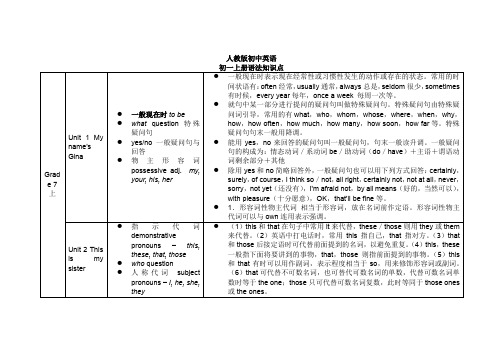
have表示“有”时,其否定形式有两种:在其后直接加not,但常用于非正式用语中;利用助动词do加not。
②如果句子的谓语是实义动词,在谓语动词前加don't,doesn't,didn't。
③no,never,seldom,hardly,nobody,little,few,nothing等否定词也可以构成否定形式。
1.表示经常性或习惯性发生的动作2.表示现在存在的状态或情况3.表示正在发生的动作或存在的状态4.表示客观事实、真理和自然现象5.用于表示较固定的、按计划、规定将要发生的动作,但只限于begin,come,go,leave,arrive,stop,return,close,open,take,start,take,place等少数动作,6.用于if,unless,once,even if(即使)等引导的条件状语从句,when,before,until,as soon as,the moment(一……就)等引导的时间状语从句,no matter+wh-/-how-或wh-ever/however等引导的让步状语从句中,代替一般将来时
人教版初中英语
初一上册语法知识点
Grade 7
上
Unit 1 My name’s Gina
人教版初中英语七年级上册语法知识点总结
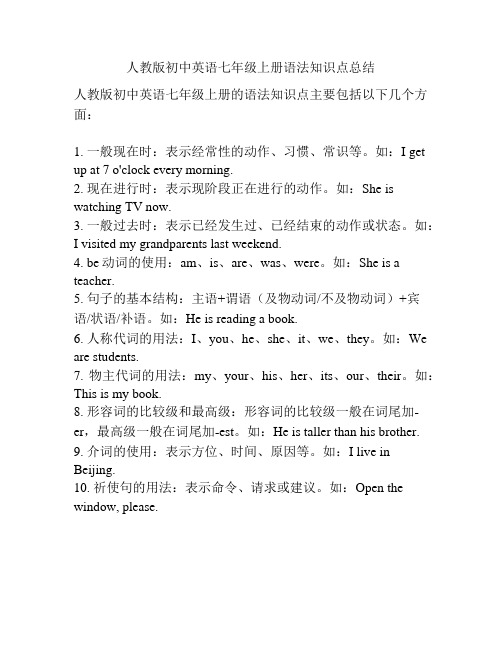
人教版初中英语七年级上册语法知识点总结
人教版初中英语七年级上册的语法知识点主要包括以下几个方面:
1. 一般现在时:表示经常性的动作、习惯、常识等。
如:I get up at 7 o'clock every morning.
2. 现在进行时:表示现阶段正在进行的动作。
如:She is watching TV now.
3. 一般过去时:表示已经发生过、已经结束的动作或状态。
如:
I visited my grandparents last weekend.
4. be动词的使用:am、is、are、was、were。
如:She is a teacher.
5. 句子的基本结构:主语+谓语(及物动词/不及物动词)+宾
语/状语/补语。
如:He is reading a book.
6. 人称代词的用法:I、you、he、she、it、we、they。
如:We are students.
7. 物主代词的用法:my、your、his、her、its、our、their。
如:This is my book.
8. 形容词的比较级和最高级:形容词的比较级一般在词尾加-er,最高级一般在词尾加-est。
如:He is taller than his brother. 9. 介词的使用:表示方位、时间、原因等。
如:I live in Beijing.
10. 祈使句的用法:表示命令、请求或建议。
如:Open the window, please.。
人教版七年级英语上册 一般现在时专练
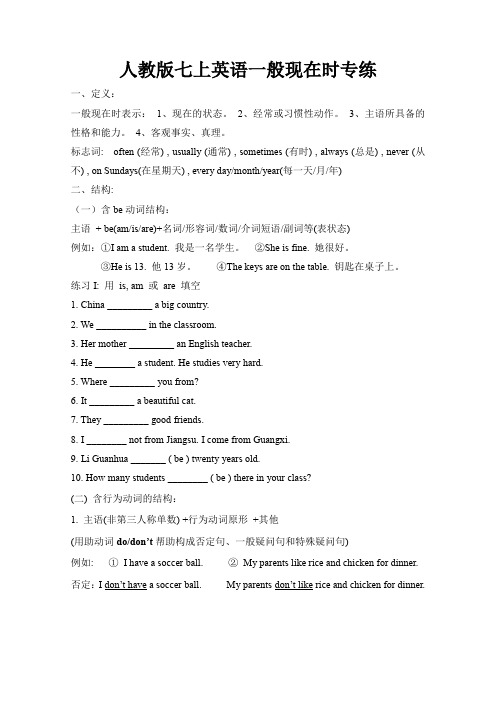
人教版七上英语一般现在时专练一、定义:一般现在时表示:1、现在的状态。
2、经常或习惯性动作。
3、主语所具备的性格和能力。
4、客观事实、真理。
标志词: often (经常) , usually (通常) , sometimes (有时) , always (总是) , never (从不) , on Sundays(在星期天) , every day/month/year(每一天/月/年)二、结构:(一)含be动词结构:主语+ be(am/is/are)+名词/形容词/数词/介词短语/副词等(表状态)例如:①I am a student. 我是一名学生。
②She is fine. 她很好。
③He is 13. 他13岁。
④The keys are on the table. 钥匙在桌子上。
练习I: 用is, am 或are 填空1. China _________ a big country.2. We __________ in the classroom.3. Her mother _________ an English teacher.4. He ________ a student. He studies very hard.5. Where _________ you from?6. It _________ a beautiful cat.7. They _________ good friends.8. I ________ not from Jiangsu. I come from Guangxi.9. Li Guanhua _______ ( be ) twenty years old.10. How many students ________ ( be ) there in your class?(二) 含行为动词的结构:1. 主语(非第三人称单数) +行为动词原形+其他(用助动词do/don’t帮助构成否定句、一般疑问句和特殊疑问句)例如: ①I have a soccer ball. ②My parents like rice and chicken for dinner. 否定:I don’t have a soccer ball. My parents don’t like rice and chicken for dinner.疑问:Do you have a soccer ball? Do your parents like rice and chicken for dinner.2.主语(第三人称单数) +行为动词的第三人称单数形式+其他(用助动词does/doesn’t帮助构成否定句、一般疑问句和特殊疑问句,行为动词用回原形)例如:Jenny/She has a blue jacket.否定句:Jenny/She doesn’t have a blue jacket.疑问句:Does Jenny/she have a blue jacket?(三)行为动词第三人称单数加-s 的形式(规则)1. 一般情况直接加- s:like--likes2. 辅音+y,把y变为i,再加-es: study-studies(学习)3. 以s,x,ch,sh 结尾,加-es: watch-watches(观看) teach-teaches(教)4. 特殊have-has,do-does,go-goes练习II. 用所给动词的正确形式填空。
人教版丨七年级上册英语语法专题复习(附练习题及答案)
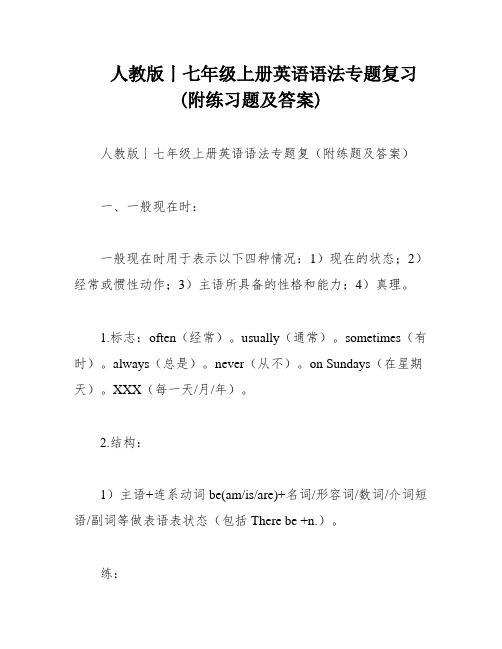
人教版丨七年级上册英语语法专题复习(附练习题及答案)人教版丨七年级上册英语语法专题复(附练题及答案)一、一般现在时:一般现在时用于表示以下四种情况:1)现在的状态;2)经常或惯性动作;3)主语所具备的性格和能力;4)真理。
1.标志:often(经常)。
usually(通常)。
sometimes(有时)。
always(总是)。
never(从不)。
on Sundays(在星期天)。
XXX(每一天/月/年)。
2.结构:1)主语+连系动词be(am/is/are)+名词/形容词/数词/介词短语/副词等做表语表状态(包括There be +n.)。
练:1.I am a student。
My name is Tom.2.Where are my shoes。
They are here.3.Who is the girl with long straight hair。
I think she is Kate.4.You and I are not in Class Six.5.XXX。
Yes。
there is.6.XXX。
No。
they aren't.2)主语(非第三人称单数)+行为动词原形+其他(用助动词do帮助构成否定句、一般疑问句和特殊疑问)。
3)主语(第三人称单数)+行为动词的第三人称单数+其他(用助动词does帮助构成否定句、一般疑问句和特殊疑问句)。
行为动词第三人称单数加-s的形式:1.-s2.辅音+y: study-studies3.以s,x,ch,sh结尾: watch-watches。
XXX4.特殊: have-has。
do-does。
go-goes。
练:1.His parents watch TV every night.肯定句:1.XXX.否定句:2.His parents do not watch TV every night.n: My brother does not do homework every day。
人教版七年级英语上册语法专项-一般现在时
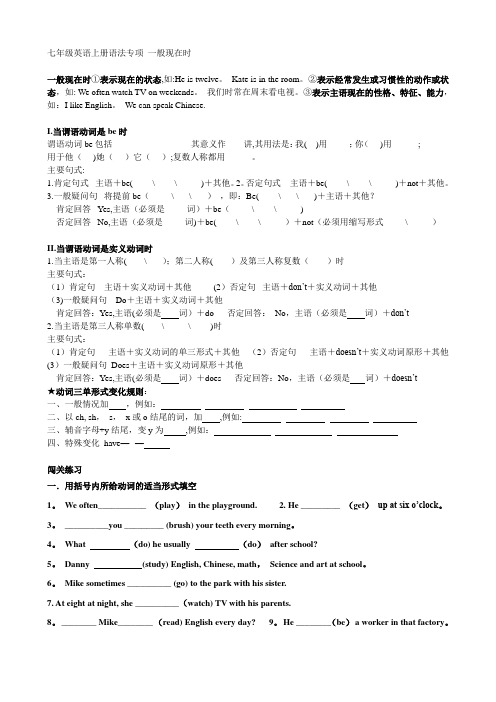
七年级英语上册语法专项一般现在时一般现在时①表示现在的状态,如:He is twelve。
Kate is in the room。
②表示经常发生或习惯性的动作或状态,如: We often watch TV on weekends。
我们时常在周末看电视。
③表示主语现在的性格、特征、能力,如:I like English。
We can speak Chinese.I.当谓语动词是be时谓语动词be包括____ _____ _____ 其意义作____讲,其用法是:我( )用_____;你()用______; ______用于他()她()它();复数人称都用______。
主要句式:1.肯定句式主语+be( ____\ ____\ _____)+其他。
2。
否定句式主语+be( ____\ ____\ _____)+not+其他。
3.一般疑问句将提前be(____\ ___\ ___),即:Be( ____\ ___\ ___)+主语+其他?肯定回答Yes,主语(必须是_____词)+be(____\ ____\ _____)否定回答No,主语(必须是_____词)+be( ____\ ____\ _____)+not(必须用缩写形式____\ _____)II.当谓语动词是实义动词时1.当主语是第一人称(____\ ___);第二人称(____)及第三人称复数(____)时主要句式:(1)肯定句主语+实义动词+其他(2)否定句主语+don’t+实义动词+其他(3)一般疑问句Do+主语+实义动词+其他肯定回答:Yes,主语(必须是词)+do 否定回答:No,主语(必须是词)+don’t2.当主语是第三人称单数(____\ _____\ ____)时主要句式:(1)肯定句主语+实义动词的单三形式+其他(2)否定句主语+doesn’t+实义动词原形+其他(3)一般疑问句Does+主语+实义动词原形+其他肯定回答:Yes,主语(必须是词)+does 否定回答:No,主语(必须是词)+doesn’t★动词三单形式变化规则:一、一般情况加,例如:二、以ch, sh,s,x或o结尾的词,加,例如:三、辅音字母+y结尾,变y为,例如:四、特殊变化have—--—闯关练习一.用括号内所给动词的适当形式填空1。
人教版最全的七年级上册英语语法
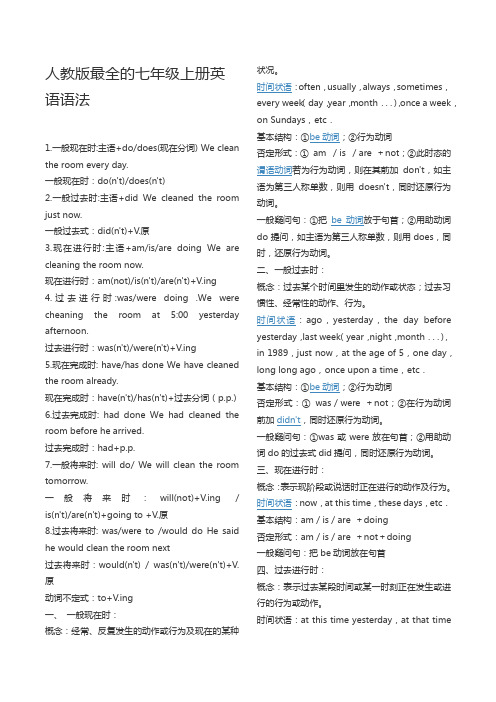
人教版最全的七年级上册英语语法1.一般现在时:主语+do/does(现在分词) We clean the room every day.一般现在时:do(n't)/does(n't)2.一般过去时:主语+did We cleaned the room just now.一般过去式:did(n't)+V.原3.现在进行时:主语+am/is/are doing We are cleaning the room now.现在进行时:am(not)/is(n't)/are(n't)+V.ing4.过去进行时:was/were doing .We were cheaning the room at 5:00 yesterday afternoon.过去进行时:was(n't)/were(n't)+V.ing5.现在完成时: have/has done We have cleaned the room already.现在完成时:have(n't)/has(n't)+过去分词(p.p.)6.过去完成时: had done We had cleaned the room before he arrived.过去完成时:had+p.p.7.一般将来时: will do/ We will clean the room tomorrow.一般将来时:will(not)+V.ing / is(n't)/are(n't)+going to +V.原8.过去将来时: was/were to /would do He said he would clean the room next过去将来时:would(n't) / was(n't)/were(n't)+V.原动词不定式:to+V.ing一、一般现在时:概念:经常、反复发生的动作或行为及现在的某种状况。
人教版七年级上册英语Unit3语法总结
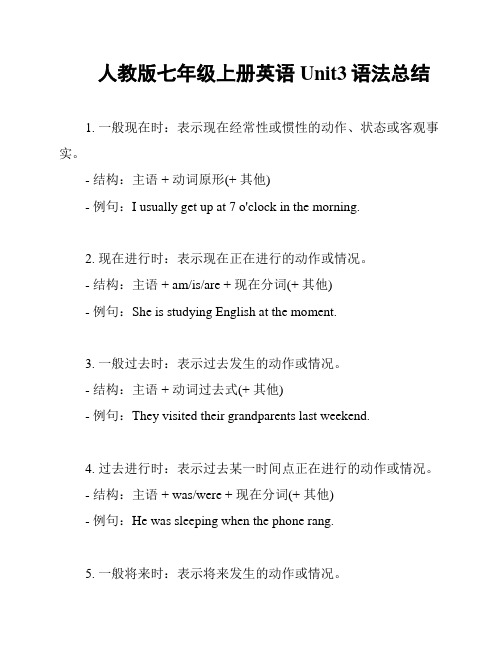
人教版七年级上册英语Unit3语法总结1. 一般现在时:表示现在经常性或惯性的动作、状态或客观事实。
- 结构:主语 + 动词原形(+ 其他)- 例句:I usually get up at 7 o'clock in the morning.2. 现在进行时:表示现在正在进行的动作或情况。
- 结构:主语 + am/is/are + 现在分词(+ 其他)- 例句:She is studying English at the moment.3. 一般过去时:表示过去发生的动作或情况。
- 结构:主语 + 动词过去式(+ 其他)- 例句:They visited their grandparents last weekend.4. 过去进行时:表示过去某一时间点正在进行的动作或情况。
- 结构:主语 + was/were + 现在分词(+ 其他)- 例句:He was sleeping when the phone rang.5. 一般将来时:表示将来发生的动作或情况。
- 结构:主语 + will + 动词原形(+ 其他)- 例句:I will go to the park tomorrow.6. 能力和意愿:can,could,may,might,must,shall,should,would等。
- 例句:You should finish your homework before going out.7. 祈使句:表示命令、请求、建议、劝告或禁止等。
- 结构:动词原形(+ 其他)- 例句:Please pass me the book.8. 直接引语和间接引语:表示他人的陈述、断言或问句等。
- 结构:直接引语:引号内的内容;间接引语:引号外的内容。
- 例句:- 直接引语:He said, "I am studying English."- 间接引语:He said that he was studying English.以上是人教版七年级上册英语Unit3语法总结,供参考。
复习一般现在时课件人教版七年级英语上册(1)
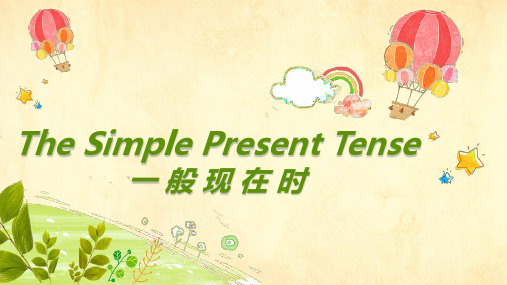
三问号:句末的句号改为问号
行为动词的一般现在时:
We like playing football very much.
eg My mother washes the coat with her hands.
1. My father_l_is_t_e_n_s_(listen) to the radio every day. 2. Mike_s_t_u_d_i_es_ (study) in a middle school. 3. She_t_a_k_e_s_(take) Eddie for a walk after supper. 4. He_w_a_s_h_e_s_(wash) clothes with his hands. 5. Simon _p_a_s_se_s_ (pass) the ball to Daniel. 7. Look at the animal, it _h_a_s_ (have)four legs.
什么时候用助动词do,什么时候用助动词does呢? 取 决 于 主 语
注意:don’t 和 doesn’t 之后动词一定要用原形
plays doesn’t play go
don’t go enjoy
don’t enjoy like doesn’t like
12
eg They read English every morning.
→ Do they read English every morning?
肯答: Yes, they do. 否答:No, they do not(don't).
人教版英语七年级上册语法一般现在时练习(含答案)
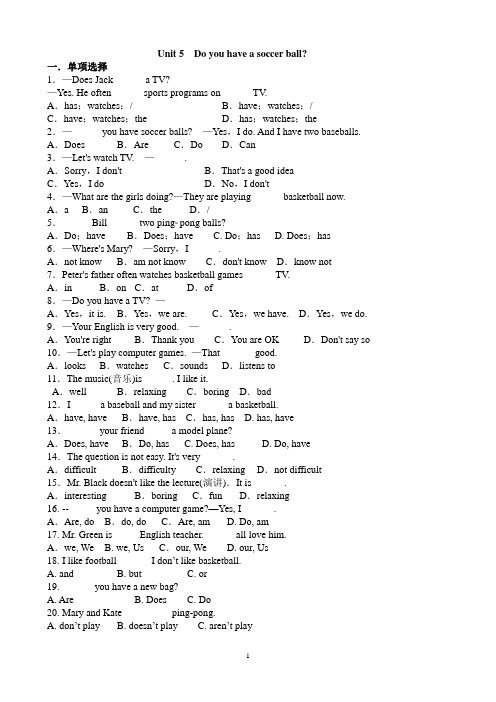
Unit 5Do you have a soccer ball?一.单项选择1.—Does Jack______ a TV?—Yes. He often ______sports programs on______ TV.A.has;watches;/B.have;watches;/C.have;watches;the D.has;watches;the2.—______you have soccer balls? —Yes,I do. And I have two baseballs. A.Does B.Are C.Do D.Can3.—Let's watch TV. —______.A.Sorry,I don't B.That's a good ideaC.Yes,I do D.No,I don't4.—What are the girls doing?—They are playing______ basketball now. A.a B.an C.the D./5.______Bill ______two pingpong balls?A.Do;have B.Does;have C. Do;has D. Does;has 6.—Where's Mary? —Sorry,I______.A.not know B.am not know C.don't know D.know not 7.Peter's father often watches basketball games ______TV.A.in B.on C.at D.of8.—Do you have a TV? —______A.Yes,it is. B.Yes,we are. C.Yes,we have. D.Yes,we do. 9.—Your English is very good. —______.A.You're right B.Thank you C.You are OK D.Don't say so 10.—Let's play computer games. —That ______ good.A.looks B.watches C.sounds D.listens to11.The music(音乐)is______. I like it.A.well B.relaxing C.boring D.bad12.I _____ a baseball and my sister______ a basketball.A.have, have B.have, has C.has, has D. has, have13.______ your friend_____ a model plane?A.Does, have B.Do, has C. Does, has D. Do, have14.The question is not easy. It's very ______.A.difficult B.difficulty C.relaxing D.not difficult 15.Mr. Black doesn't like the lecture(演讲).It is ______.A.interesting B.boring C.fun D.relaxing16. --_____ you have a computer game?—Yes, I ______.A.Are, do B.do, do C.Are, am D. Do, am17. Mr. Green is _____English teacher. ______all love him.A.we, We B. we, Us C.our, We D. our, Us18. I like football ______ I don’t like basketball.A. andB. butC. or19. ______ you have a new bag?A. AreB. DoesC. Do20. Mary and Kate ______ ping-pong.A. don’t playB. doesn’t playC. aren’t play21. —Do you have ______ volleyball? —Yes. Let’s play ______ volleyball.A. a; /B. /; aC. a; a22. I don't ___________ a dictionary. She ___________ one.A. has; haveB. have; haveC. have; hasD. have; has a23. —Is this your bike?—No, it is______. ____is red.A. her; HisB. his; HerC. mine; HerD. hers; Mine24. _____ that old woman _____ a house near the river?A. Do; hasB. Does; haveC. Does; hasD. Do; have25. Every day ______ has a good rest and does his homework after school.A. TomB. KateC. Tom and KateD. Tom's sister二.用所给词的正确形式填空1.My sister ______(not have)a soccer ball.2.Bruce only ______(watch)sports on TV!3.Michael ______(have)a computer.4.Let's ______(go)to play soccer.5.Does your father ______(play)sports every day?6.Where ______(be)your books?7.That ______(sound)fun.8.We can see some ______(basketball)in the classroom.9.Please take ______(they)to your English teacher.10.—Is that your book?—Let ______(I)see.11. _______(do) she have a computer?12. –Let’s ________(play) soccer.--That ________(sound) good.13. We can’t find our tape player. Can you help______(we)?14. Her brother ________(have) 7 basketball.15. Jenny ____________ volleyball. (not play) She can ____________ soccer. (play)三.用have或has填空1. A: Do you ________ a soccer ball?B: No, I don’t.A: What about Billy?B: I think he______ one.2.There are some children in the room. They all ______ new books. But they don’t ______any color pencils. Tom______ a big pencil-box. Jack _______ a small one. What about Jenny? Oh, she _______two.四.句型转换1.Jeff has two computers.(改为一般疑问句)______ Jeff ______ two computers?2.Bill has a soccer ball.(用some替换a 改写句子)Bill ______ some soccer ______.3.His friend watches TV every morning.(改为否定句)His friend ______ ______ TV every morning.4.His grandfather does sports every day.(改为同义句) His grandfather ______ ______ every day. 5.—Does Tom have a watch?(作肯定回答)—______,he ______.6. H e has 3 soccer balls. (改为一般疑问句)________ he ______ 3 soccer balls?7. My father plays sports every day. (改为否定句)My father _______ ______ sports every day.8. He watches TV every day. (改为一般疑问句)________ ________ ________ TV every day?9. Does your brother have a computer? (作否定回答) _______, ________ ________.10. He has eight pencils. (改为否定句)He ______ ______ eight pencils.11. Tim has a TV in his room. (改为一般疑问句)______ Tim ______ a TV in his room?12. —Do they have a computer?(作否定回答)—______,______ ______.13 I have a volleyball. (用Gina代替I)Gina ______ a volleyball.14. We have a big TV in our house. (改为否定句)We _______ _______ a big TV in our house.15. Kate has some money in her pocket.否定句:__________________________一般疑问句:_______________________16.Her volleyballs are in her room. (划线提问)_______ _______ her volleyballs?17.We play soccer ball .(改为祈使句)_______ ______ soccer ball.五.改错1. Does his father likes baseball?______________________________________2.Let’s us go to watch a soccer game.______________________________________3. Her sister does not has a baseball bat.______________________________________4.Helen and I am n’t in the same class.______________________________________5.Do your brother have a dictionary?______________________________________Unit 5Do you have a soccer ball?答案一.单项选择1-5. BCBDB 6-10.CBDBC 11-15.BBAAB 16-20.BCBCA 21-25.ACCDA 二.用所给词的正确形式填空1.doesn’t have2.watches3.has4.go5.play6.are7.sounds8.basketballs 9.them 10.me 11.Do 12.play,sounds 14.has 15.doesn’t,play三.用have 或has 填空1.have,has2.have,have,has,has, has四.1.Does,have2.has,balls3.doesn’t watch4.plays sports5.Yes, does6.Does,have7.doesn’t play8.Does, he , watch9. No, he doesn’t10.d oesn’t have 11.Does,have 12.No, they don’t 13.has 14.don’t have15.K ate doesn’t have any money in her pocket. Does Kate have any money in her pocket?16.W here, are 17.Let’s play五.改错1. Does his father like baseball?2.Let’s go to watch a soccer game.3. Her sister does not have a baseball bat.4.Helen and I aren’t in the same class.5.Does your brother have a dictionary?。
七年级上册英语第一单元重点语法
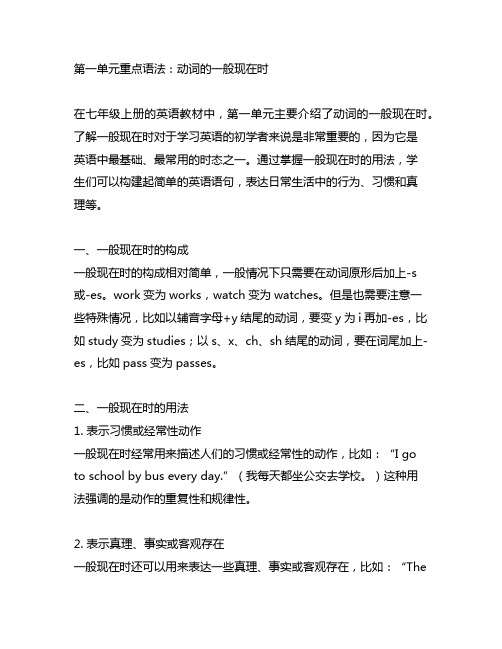
第一单元重点语法:动词的一般现在时在七年级上册的英语教材中,第一单元主要介绍了动词的一般现在时。
了解一般现在时对于学习英语的初学者来说是非常重要的,因为它是英语中最基础、最常用的时态之一。
通过掌握一般现在时的用法,学生们可以构建起简单的英语语句,表达日常生活中的行为、习惯和真理等。
一、一般现在时的构成一般现在时的构成相对简单,一般情况下只需要在动词原形后加上-s或-es。
work变为works,watch变为watches。
但是也需要注意一些特殊情况,比如以辅音字母+y结尾的动词,要变y为i再加-es,比如study变为studies;以s、x、ch、sh结尾的动词,要在词尾加上-es,比如pass变为passes。
二、一般现在时的用法1. 表示习惯或经常性动作一般现在时经常用来描述人们的习惯或经常性的动作,比如:“I goto school by bus every day.”(我每天都坐公交去学校。
)这种用法强调的是动作的重复性和规律性。
2. 表示真理、事实或客观存在一般现在时还可以用来表达一些真理、事实或客观存在,比如:“Thesun rises in the east.”(太阳从东方升起。
)在这个句子中,使用一般现在时表明了一个客观存在的事实。
3. 表示心理状态或常态有时一般现在时也可以表示人们的心理状态或一些常态情况,比如:“I understand your feelings.”(我理解你的感受。
)在这个句子中,使用一般现在时表达了一种心理状态。
三、对一般现在时的个人理解对于初学者来说,掌握一般现在时是十分重要的,因为它是构建英语语句的基础。
在学习过程中,我们还需要多做练习,不断地接触和运用一般现在时,才能更加熟练地掌握它的用法。
我们也要注意一些特殊情况的变化规则,比如第三人称单数加-s或-es的情况,以及特殊结尾动词的变化规则。
总结通过本文的介绍,相信大家对一般现在时有了更深入的了解。
人教版七年级英语时态总结
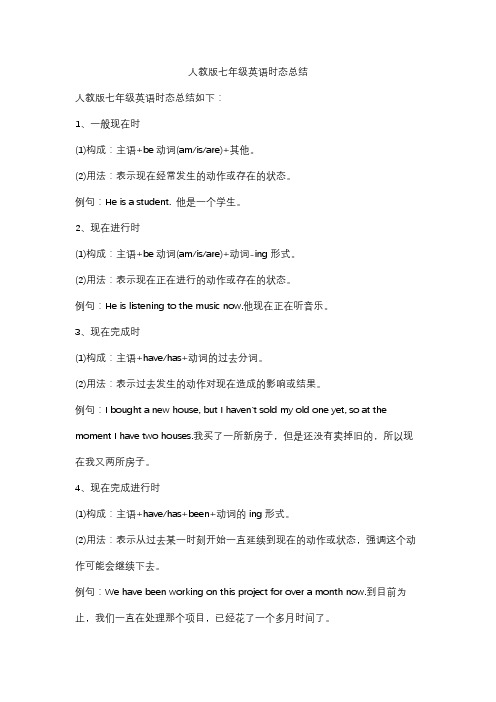
人教版七年级英语时态总结人教版七年级英语时态总结如下:1、一般现在时(1)构成:主语+be动词(am/is/are)+其他。
(2)用法:表示现在经常发生的动作或存在的状态。
例句:He is a student. 他是一个学生。
2、现在进行时(1)构成:主语+be动词(am/is/are)+动词-ing形式。
(2)用法:表示现在正在进行的动作或存在的状态。
例句:He is listening to the music now.他现在正在听音乐。
3、现在完成时(1)构成:主语+have/has+动词的过去分词。
(2)用法:表示过去发生的动作对现在造成的影响或结果。
例句:I bought a new house, but I haven't sold my old one yet, so at the moment I have two houses.我买了一所新房子,但是还没有卖掉旧的,所以现在我又两所房子。
4、现在完成进行时(1)构成:主语+have/has+been+动词的ing形式。
(2)用法:表示从过去某一时刻开始一直延续到现在的动作或状态,强调这个动作可能会继续下去。
例句:We have been working on this project for over a month now.到目前为止,我们一直在处理那个项目,已经花了一个多月时间了。
5、一般过去时(1)构成:主语+动词的过去式。
(2)用法:表示过去某个时间发生的动作或存在的状态。
例句:I bought some fruits yesterday.我昨天买了一些水果。
6、过去进行时(1)构成:主语+was/were+动词-ing形式。
(2)用法:表示过去某个时间正在进行的动作或存在的状态。
例句:I was travelling in London last summer vacation.去年暑假我在伦敦旅行。
7、过去完成时(1)构成:主语+had+动词的过去分词。
英语人教新目标七年级上册have一般现在时用法 卢本勤
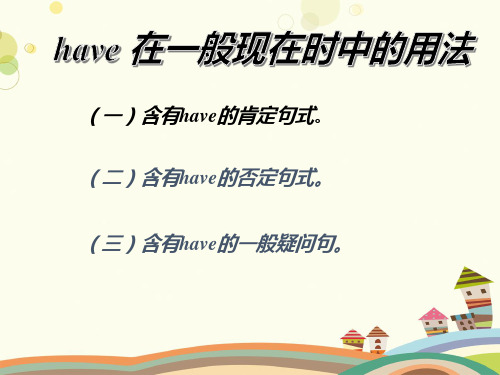
(一)have的肯定句句式结构 : 主语+have/has+其他...
I have a baseball.(我有一个棒球) She has a book.(她有一本书)
1.当主语为第一人称,第二人称单复数,第三人 称复数时,谓语动词用have。 2.当主语为第三人称单数时,谓语动词用has。
We have schoolbags. Linda has a ruler.
(二)have的否定句句式结构: 主语+don't/doesn't+have+其它...
We don't have any oranges.(我们没有橙子) Tom doesn't have a cat.(汤姆没有猫)
1.当主语是非第三人称单数时,使用don't have 2.当主语为第三人称单数时,使用doesn't have 在否定句中have不随主语进行变化,永远只用原形。
(一)含有have的肯定句式。 (二)含有have的否定句式。 (三)含有have的一般疑问句。
一般现在时表示经常性或习惯性的动作或状 态,也可以表示普遍真理。一般现在的构成及 句式变化包括be动词和实义动词的句子。本节 课将学习含有实义动词have(有)的一般现在 时。
have 意为“有、、、”,用在一般现在时态 中,其形式须与主语的人称和数保持一致。当 主语为第三人称单数时,变为has;其余情况用 have。
Does Tom have a sister?(Tom 有一个妹妹吗?) Yes,he does./No.he doesn't.
Does she have a watch?(她有一块手表吗?) Yes,she does./No,she doesn't.
人教出版英语七年级上册unit57一般现在时
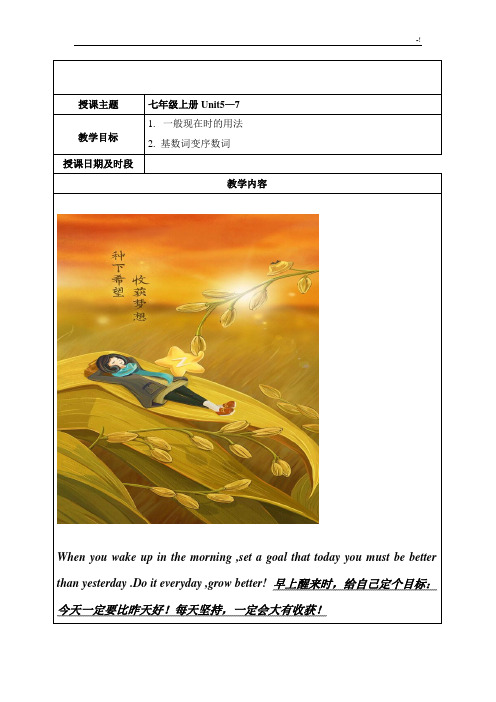
I do my homeworkevery day.
Bob does his homework every day.
3)在一般现在时中,do/does可用来替代上文出现过的动词,以避免重复。
Do you have a soccer ball?Yes, I do.(do代have)
Does she have an eraser? Yes, she does.
-Yes. I am. / No, I'm not.
2.行为动词:
1)肯定句:主语+行为动词(+其它)。如:
We study English.我们学习英语。
当主语为第三人称单数(he, she,it)时,要在动词后加"-s"或"-es"。如:Mary likes Chinese.玛丽喜欢汉语。
2)否定句:主语+ don't( doesn't ) +动词原形(+其它)。如:
Sport“运动”,修饰名词时,总是用复数形式。sports meeting运动会sports shoes运动鞋
11. play/do sports做运动
12.watch TV看电视
13.on TV/on the radio/on the computer/on the phone在电视上/在收音机上/在电脑上/在电子产品上用介词on。
练一练:
根据句子意思,用所给词的适当形式填空。
1、_________ you __________( have ) a tennis ball ?
2、_________ your cousin __________( play ) ping-pong?
新人教版七年级上册英语语法、短语和知识点总结
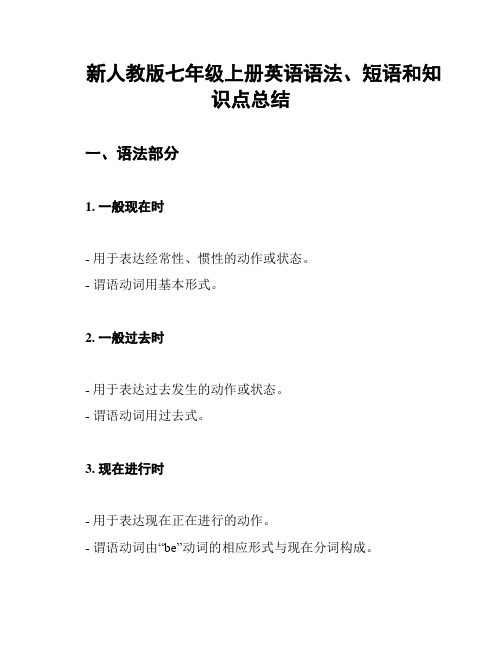
新人教版七年级上册英语语法、短语和知
识点总结
一、语法部分
1. 一般现在时
- 用于表达经常性、惯性的动作或状态。
- 谓语动词用基本形式。
2. 一般过去时
- 用于表达过去发生的动作或状态。
- 谓语动词用过去式。
3. 现在进行时
- 用于表达现在正在进行的动作。
- 谓语动词由“be”动词的相应形式与现在分词构成。
4. 动词不定式
- 作为名词、形容词或副词的补足语。
- 用于表达目的、原因、结果等。
二、短语部分
1. in front of
- 在...前面
2. on the right/left
- 在右边/左边
3. at the back of
- 在...后面
4. go straight
- 直走
三、知识点部分
1. 单复数
- 名词的复数形式变化规则。
2. 冠词
- a/an 用于泛指单数可数名词前。
- the 用于特指名词前。
3. 人称代词
- I, you, he, she, it, we, they。
4. 并列连词
- and, but, or 用于连接并列的词、短语或句子。
四、总结
本文档总结了新人教版七年级上册英语课程中的语法、短语和
知识点。
内容包括一般现在时、一般过去时、现在进行时等语法部分,以及一些常用短语和知识点。
希望对研究者有所帮助。
以上是对新人教版七年级上册英语语法、短语和知识点的总结。
注意:
本文档中的内容仅供参考。
人教版初中英语七年级上册第四单元《一般现在时》语法教学PPT课件

01 概念与用法
一般疑问句结构变化
Are you a good person? Is she/he a good person.
肯定句变一般疑问句,只需将 be动词提前
行为动词 的一般现在时是怎么构成的呢?
01 概念与用法
观察下列句子
1、I play football every day . 2、You play football every day . 3、My friends play football every day . 4、He plays football every day . 5、Tom plays football every day . 6、My brother plays football every day .
01 概念与用法
第三人称单数变化规则
一般动词后加-s。 like--likes He likes playing basketball.
以辅音字母+y结尾的单词, 变y为i,再加-es。 study--studies He studies English very hard.
以s、x、ch、sh结尾,后加es。 watch--watches My father watches TV every night.
Part. five
课后作业
改错题 1.Our English doesn’t likes music. 2. Tony goes always to school at eight o’clock. 3. Does your parents like watching TV? 4. Lily haves lunch at school. 5. My sister doesn’t her homework every .
人教版英语七年级上册一般现在时
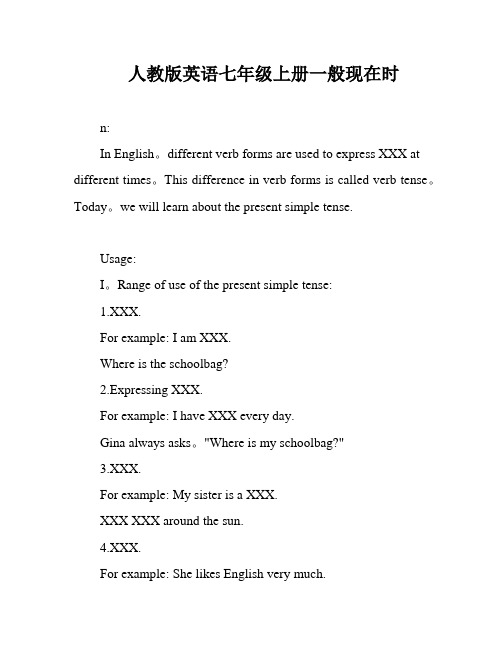
人教版英语七年级上册一般现在时n:In English。
different verb forms are used to express XXX at different times。
This difference in verb forms is called verb tense。
Today。
we will learn about the present simple tense.Usage:I。
Range of use of the present simple tense:1.XXX.For example: I am XXX.Where is the schoolbag?2.Expressing XXX.For example: I have XXX every day.Gina always asks。
"Where is my schoolbag?"3.XXX.For example: My sister is a XXX.XXX XXX around the sun.4.XXX.For example: She likes English very much.Bill XXX beef。
XXX chicken.The above are the basic usage range of the present simple tense。
In n。
the present simple tense has some other special uses。
such as being used in some XXX:The present simple tense is often used with adverbs such as often。
sometimes。
always。
usually。
etc。
It is also often used with time adverbs such as every day。
英语人教版七年级上册一般现在时的一般疑问句及其回答
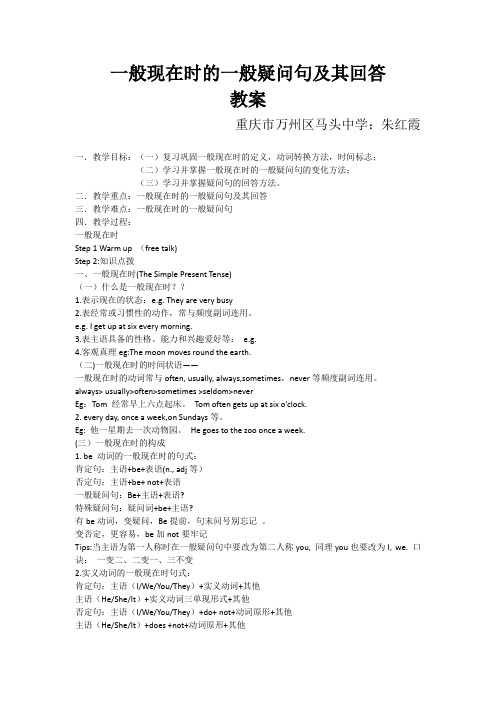
一般现在时的一般疑问句及其回答教案重庆市万州区马头中学:朱红霞一.教学目标:(一)复习巩固一般现在时的定义,动词转换方法,时间标志;(二)学习并掌握一般现在时的一般疑问句的变化方法;(三)学习并掌握疑问句的回答方法。
二.教学重点:一般现在时的一般疑问句及其回答三.教学难点:一般现在时的一般疑问句四.教学过程:一般现在时Step 1 Warm up (free talk)Step 2:知识点拨一、一般现在时(The Simple Present Tense)(一)什么是一般现在时??1.表示现在的状态:e.g. They are very busy2.表经常或习惯性的动作,常与频度副词连用。
e.g. I get up at six every morning.3.表主语具备的性格、能力和兴趣爱好等:e.g.4.客观真理eg:The moon moves round the earth.(二)一般现在时的时间状语——一般现在时的动词常与often, usually, always,sometimes,never等频度副词连用。
always> usually>often>sometimes >seldom>neverEg:Tom 经常早上六点起床。
Tom often gets up at six o’clock.2. every day, once a week,on Sundays等。
Eg: 他一星期去一次动物园。
He goes to the zoo once a week.(三)一般现在时的构成1. be 动词的一般现在时的句式:肯定句:主语+be+表语(n., adj等)否定句:主语+be+ not+表语一般疑问句:Be+主语+表语?特殊疑问句:疑问词+be+主语?有be动词,变疑问,Be提前,句末问号别忘记。
变否定,更容易,be加not要牢记Tips:当主语为第一人称时在一般疑问句中要改为第二人称you, 同理you也要改为I, we. 口诀:一变二、二变一、三不变2.实义动词的一般现在时句式:肯定句:主语(I/We/You/They)+实义动词+其他主语(He/She/It)+实义动词三单现形式+其他否定句:主语(I/We/You/They)+do+ not+动词原形+其他主语(He/She/It)+does +not+动词原形+其他一般疑问句:Do+主语(I/we/you/they)+动词原形+其他?Does+主语(he/she/it)+动词原形+其他?特殊疑问句:疑问词+ do/does+主语+动词原形+其他复习动词三单式1)动词三单形式变化规律1. 一般情况下,直接在词尾加()eg: work---works2. 以x, s, o, sh, ch结尾的动词,在词尾加( )eg: wash—washes watch—watches3. 以辅音字母加y 结尾的动词,把y 变为( ) 加( ) eg:study—studies练习:do --fix-- go -- read -- look-- wash-- pass-- play-- enjoy-- watch-- teach-- carry--box-- study-- swim--谓语为实义动词,变疑问,一二人称和复数do 提前,三单把does 来帮助,句末问号别忘记变否定,也容易,do/does加not就OK!Step3、拓展练习How much______it______?(cost)2.The shop___________(close)at this time of day.3.My teacher often_________(tell)us not to play on thestreet.4.Light___________(travel)much faster than sound.Step4 一般现在时专项练习1.This is my pencil ? (变一般疑问句your pencil ?2. These r ed socks are Kate’s . (变一般疑问句socks Kate’s ?3. I want to buy a big green bag . (变特殊疑问句you want to buy ?4. Mary does not have any books . (变肯定句)Mary books .5. The clothing shop is on sale . (变为否定句)6. She likes the black bag very much . (变为否定句)7. I buy the pants for only 50 Yuan. (用she改写句子)the pants for only 50 Yuan.8. It’对画线部分提问)9. 对画线部分提问)Lily and Lucy ?10. Her dog is 2 years and 5 months old . (变为否定句)Her dog 2 years and 5 months old .11. I usually get up at seven o’clock . (用he改写句子)at seven o’clock .12. He often has hamburger and apples for dinner . (变为一般疑问句)13. My family always like thrillers . (对画线部分提问)your family always like ?14. Jane’s sister wants to see the comedy . (变为一般疑问句)’15. 对画线部分提问) Maria and Jack come to this school ?16. 对画线部分提问Titanic ?17. I think this documentary is boring . (变复数句)think boring .18. 对画线部分提问) ?19. Julia and her mother can live (居住) in the same city . (变一般疑问句)Julia and her mother live in the same city ?20. The teacher wants to join a music club . (变为特殊疑问句)the teacher want to join ?二.用be动词的适当形式填空。
- 1、下载文档前请自行甄别文档内容的完整性,平台不提供额外的编辑、内容补充、找答案等附加服务。
- 2、"仅部分预览"的文档,不可在线预览部分如存在完整性等问题,可反馈申请退款(可完整预览的文档不适用该条件!)。
- 3、如文档侵犯您的权益,请联系客服反馈,我们会尽快为您处理(人工客服工作时间:9:00-18:30)。
Teaching plan
一般现在时(Review)
一、教材分析:
《新课程标准》强调要从学生的学习兴趣和生活经验出发,倡导体验、实践、参与、合作与交流的学习方式和任务型的教学途径,发展学生的综合语言运用能力,复习课也应该遵循这样的原则。
本节课的内容是对5B第一、三、四单元的重点内容—一般现在时的综合复习。
一般现在时是小学阶段的重难点,如何让学生认识到一般现在时的用法,是本节课的任务。
因此我围绕“My friends”这一话题展开教学,先向学生介绍我的好朋友Billy的情况,让学生模仿Billy用一般现在时第一人称介绍自己。
再由学生的自我介绍过渡到第三人称单数的用法,其中我设计了一个环节:猜朋友,这样的教学情景既让学生很感兴趣又可以充分练习到一般现在时疑问句的用法。
这样在复习中有意识、有步骤地把机械性操练和交际性操练结合起来,引导学生把所学知识运用到生活中去。
另外本课多媒体课件的设计也结合学生的实际情况,创设了既符合儿童心理特征又很自然的活动情景,让学生在情景中学会交际,在交际中学会语言。
二、教学目标:
1.知识目标:
1通过复习能比较熟练地掌握一般现在时的用法。
2能综合运用所学的日常交际用语和句型。
2.技能目标:
培养学生的语言运用能力,体现语言的实际性和交际性。
3.情感目标:
在教学活动中,培养学生的观察、记忆、思维和想象能力,发展学生的发散思维能力。
三、教学重难点:
理解并掌握一般现在时的用法。
四、教具准备
多媒体课件、听力材料、学生个人信息卡
五、教学过程描述
Step 1 Free talk:
T: What day is it today?
S1: It’s …
T: What’s the date?
S1: It’s …
T: What’s the weather like today?
S1: It’s …
T: What lessons do you have this morning?
S2: I have …
T: What subject do you like?
S2: I like …
T: Do you study … well?
S2: Yes, I do./ No, I don’t.
T: Oh, you are so great! I think you should study harder. Try your best, ok? T: I like PE, because I like sports.
Do you like sports?
I like playing table tennis. What sport do you like?
Do you … every day?
Step 2 Review the phases
1T: Good, we should do some exercise to keep healthy.
There are many kinds of sports.
Can you say them quickly?
S: …
2T: After school, we can do these sports, and what else can you do?
I usually read books and watch TV after school.
What do you usually do after school?
S: …
T: Now let’s play a game.
Step 3 复习一般现在时,主语是第一、二人称时的用法
1 T: I think, all of you study English well.
You know, I have a new friend; he studies English well, too.
Do you want to know him?
Now you can ask him some questions.
S: 人机对话,问Billy
如下问题What’s your name?
How old are you?等
T: Let’s read Billy’s self introduction.
T: Now please fill in your information card.
S: 学生填写自己的信息卡,并模仿Billy的自我介绍,向全班汇报。
Step 4 复习一般现在时,主语是第三人称单数时的用法
1 T:Look, this is my good friend, Miss Ji. Ppt7
You can ask me these questions.
How old is she?
Where does she live? And so on.
Can you try?
2 T: I have another friend in our class. Can you guess who my friend is? S: Is your friend a boy?
Where does he live?
Does he jump high?
…
I think your friend is …
T: Yes, you’re right. / No, you’re wrong.
3 T: Now let’s guess who your friend is.
4 Introduce your friend for us.
Step 5 总结一般现在时的用法
1这节课,我们复习的是一般现在时的用法,一起来看一看一般现在时的“自我介绍”!Hello!大家好,我叫“一般现在时”,你想知道我的故事吗?
我常常与often, usually, Sometimes ,on Sundays等词连用,动词用原形。
不过当主语是第三人称单数时,要在动词后加s或es。
例:I often read books at home.
She plays the violin every day.
如果是疑问句,还要用助动词do (主语是第三人称单数用does)构成,动词用原形。
例:Do you usually play football after school ?
What does he do on Sundays?
小朋友们,下次见到我时,千万不要忘记我是“一般现在时”啊!See you!
2我们知道一般现在时,主语是第三人称单数时动词会有变化。
我们一起来总结一下,有哪些变化呢?
顺口溜:肯定句中,他、她、它
动词后面加尾巴。
一般动词直接加s
有些加es
以辅音字母加结尾的,变y为i加es
3 读一读变化后的动词。
Step 6 Let’s do some exercise.
1 Finish the exercise with proper words.
a. Sometimes, I ________ basketball after school.
b. My father usually ________ newspapers in the evening.
c. ________ your mother _________ shopping every Friday afternoon?
d. What ________ Helen usually ________ on Saturdays?
e. I like Chinese, but my friend, Ben _________ PE.
2 Listening exercise.
T: I wrote an e-mail to you. Please help me finish it.
S: Listen and fill in the blanks.
Step 7 Homework
写一篇电子邮件,向我介绍你的好朋友们。
This is my friend. Her name is ….she’s …. She lives in …. she likes…
[教后反思]
这堂课充分体现了以学生为主体的教学思想。
主要体现出以下几个特点:
1、趋向真实交际的教学设计。
以介绍朋友为主题自然而巧妙地展开复习,使课堂教学从一开始就进入真实的交际场景,形成活跃的课堂气氛。
学生为能够运用自己熟悉的内容与教师交流而获得成功感,从而使学习的自信心倍增。
学生在教师的引导下,既进行了存在信息差的实际交流,又练习和掌握了语言结构和用法。
2、让每一位学生都参加到语言实践活动中来
本节课体现了“让每一位学生都参加到语言实践活动中来”的新课程理念,采用大容量、高密度、快节奏的训练方式,有意识、有步骤地展开交际。
教师设计的各个环节的活动,都有利于学生主动参与;课堂上学生语言丰富、思维活跃,对所学内容掌握到位,运用熟练,收到了很好的教学效果。
